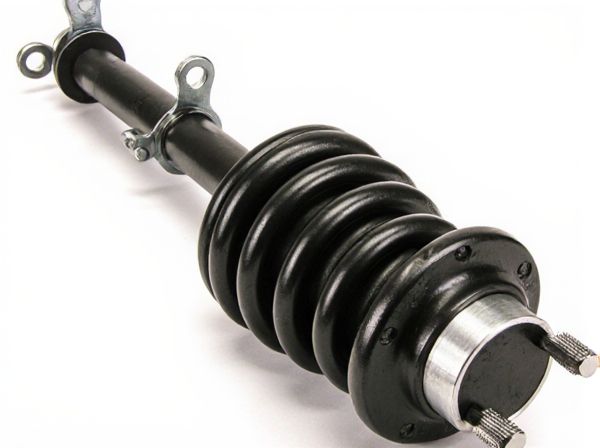
Photo illustration: Custom Driveshaft vs OEM Driveshaft
Custom driveshafts offer tailored performance enhancements and precise fitment for specialized vehicles or modified setups, ensuring optimal power transfer and durability. OEM driveshafts provide reliable, manufacturer-tested quality designed to meet standard specifications and maintain vehicle warranty compliance. Choosing between the two depends on your specific driving needs, budget, and performance goals.
Table of Comparison
| Feature | Custom Driveshaft | OEM Driveshaft |
|---|---|---|
| Fitment | Precision tailored to vehicle specs | Standardized factory fit |
| Material Quality | High-performance alloys, lightweight options | Durable stock materials |
| Performance | Enhanced torque capacity, reduced vibration | Designed for everyday driving |
| Durability | Improved strength for high-stress use | Reliable under normal conditions |
| Cost | Higher initial investment | More affordable, factory pricing |
| Warranty | Varies by manufacturer | Usually covered by vehicle warranty |
| Customization | Complete customization available | Limited to OEM specifications |
Understanding Driveshafts: Custom vs OEM
Custom driveshafts offer tailored specifications that optimize performance for specific vehicle modifications, enhancing torque capacity and reducing rotational mass compared to OEM driveshafts. OEM driveshafts prioritize reliability and compatibility, engineered to meet manufacturer standards and ensure balanced driveline operation under typical driving conditions. Understanding the differences helps in selecting a driveshaft that matches driving demands, with custom options favoring high-performance applications and OEM units excelling in durability and factory fitment.
Key Differences Between Custom and OEM Driveshafts
Custom driveshafts offer tailored specifications such as length, material, and joint type to match unique vehicle requirements and enhance performance, whereas OEM driveshafts are designed to meet factory standards for compatibility and reliability. Custom driveshafts typically use high-strength materials like chromoly steel or carbon fiber for improved durability and reduced weight, while OEM driveshafts commonly utilize standard steel for cost-effective production and consistent quality. Precision balancing and specialized design in custom driveshafts optimize driveline vibrations and power transfer, contrasting with OEM driveshafts which prioritize standardized fitment and broad application compatibility.
Performance Benefits of Custom Driveshafts
Custom driveshafts offer enhanced performance benefits by being precisely engineered to match specific vehicle requirements, resulting in improved torsional rigidity and balanced weight distribution. These driveshafts reduce vibrations and increase drivetrain efficiency, contributing to smoother power delivery and better handling during high-performance driving. Unlike OEM driveshafts, which are designed for general compatibility, custom driveshafts optimize strength and durability tailored to aggressive driving conditions and increased horsepower.
OEM Driveshafts: Reliability and Compatibility
OEM driveshafts provide superior reliability due to rigorous factory testing and adherence to strict quality standards, ensuring consistent performance under various driving conditions. They are engineered specifically for each vehicle model, guaranteeing perfect compatibility with existing drivetrain components and reducing the risk of premature wear or failure. Choosing an OEM driveshaft minimizes installation issues and maintains the vehicle's original handling characteristics, offering peace of mind for long-term durability.
Material Choices: Custom vs OEM Driveshafts
Custom driveshafts often utilize advanced materials such as chromoly steel, carbon fiber, or billet aluminum, offering superior strength-to-weight ratios compared to OEM driveshafts. OEM driveshafts typically use standard steel or aluminum alloys optimized for cost-efficiency and durability in mass production. Selecting a custom driveshaft material allows for tailored performance characteristics, including reduced rotational mass and increased torsional rigidity, which improve vehicle responsiveness and drivetrain efficiency.
Cost Comparison: Custom Driveshaft vs OEM Driveshaft
Custom driveshafts typically incur higher upfront costs due to precise engineering, materials, and labor tailored to specific vehicle needs. OEM driveshafts generally offer lower initial prices as they are mass-produced and designed for standard fitment, making replacements more economical. Over time, custom driveshafts may provide better value through enhanced durability and performance, potentially reducing maintenance expenses compared to OEM options.
Installation and Fitment Considerations
Custom driveshafts offer precise fitment tailored to specific vehicle modifications, ensuring optimal alignment and balanced rotation, which reduces vibration and wear during installation. OEM driveshafts are designed for standardized specifications, providing straightforward installation with guaranteed compatibility but limited flexibility for altered drivetrains. Evaluating suspension lift, drivetrain angles, and shaft length is critical for custom driveshaft installations to prevent premature failure and maintain drivetrain efficiency.
Longevity and Maintenance Requirements
Custom driveshafts often offer enhanced longevity compared to OEM driveshafts due to the use of high-performance materials and tailored engineering, resulting in improved durability under extreme driving conditions. Maintenance requirements for custom driveshafts can be higher, as specialized components may necessitate regular inspections and servicing to ensure optimal function. OEM driveshafts typically require less frequent maintenance, benefiting from standardized manufacturing and compatibility with factory specifications, but may experience shorter lifespan in high-stress applications.
Customization Options for Driveshafts
Custom driveshafts offer extensive customization options tailored to specific vehicle requirements, including material selection, length adjustments, and spline configurations, which OEM driveshafts typically lack due to standardized manufacturing. These customizations enhance performance by optimizing weight, strength, and torque capacity to match unique driving conditions or modifications. Precision engineering in custom driveshafts allows for improved balance and durability, catering to high-performance and specialty applications that OEM driveshafts are not designed to handle.
Choosing the Right Driveshaft for Your Vehicle
Selecting the right driveshaft involves evaluating the specific performance requirements, durability, and compatibility with your vehicle's drivetrain. Custom driveshafts offer tailored solutions for high-performance or modified vehicles, providing enhanced strength and balance. OEM driveshafts ensure factory specifications and reliability for standard applications, making them ideal for maintaining stock vehicle performance and warranty compliance.
 caratoz.com
caratoz.com